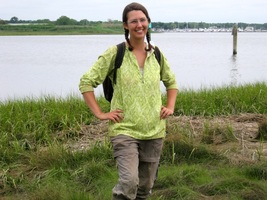
Imagine...it's early morning in northern Florida. As the sun creeps up above the tree line in the distance, you are unrolling a specially-designed net. You angle the net so that it forms a nearly-invisible wall at a break in the shrubby vegetation between the flooded salt marsh to your left and the road at your right. Net in place, you and your field-mates walk back a ways and then slowly make your way toward the net. In front of you, dozens of small brown birds scurry along the ground or flutter from bush to bush. Nearing the net, you start to run, and the birds fly--some hitting the net, others scattering over, under, around and back. As you reach out for a captured bird, you notice a glint of metal and red plastic on its leg. Suppressing your excitement, you carefully remove the net from the bird--legs, wings, and head slip free. The bird safe and secure in your hand, you lift the banded leg and read the number imprinted in the aluminum. Yes. This is the same bird you caught at this site the previous winter. The same bird your friend and collaborator banded all the way up in Maine two summers earlier.
It is moments such as these that make life as a field biologist so rewarding. The feeling of sitting at my computer, coalescing the data into meaningful analyses that bring further clarity to some aspect of the birds' ecology is similarly rewarding--if without the sense of awe I feel each time I hold a bird (especially one I have encountered before!).
My interest in birds as a science is built upon my love of them in the field, both as a casual observer and as a researcher. While broadly interested in behavior, ecology, and conservation, I am particularly interested in considering the entire annual cycle and the nuanced ways in which events in a bird's life during one season can influence what happens to it during subsequent seasons.
It is moments such as these that make life as a field biologist so rewarding. The feeling of sitting at my computer, coalescing the data into meaningful analyses that bring further clarity to some aspect of the birds' ecology is similarly rewarding--if without the sense of awe I feel each time I hold a bird (especially one I have encountered before!).
My interest in birds as a science is built upon my love of them in the field, both as a casual observer and as a researcher. While broadly interested in behavior, ecology, and conservation, I am particularly interested in considering the entire annual cycle and the nuanced ways in which events in a bird's life during one season can influence what happens to it during subsequent seasons.
